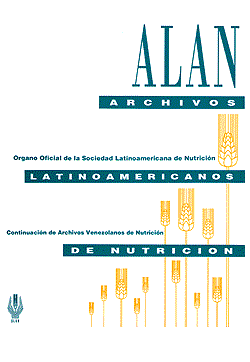Chronic caffeine administration prevents postprandial glucose disturbance in rats
DOI:
https://doi.org/10.37527/2021.71.4.007Keywords:
Cafeína, Dieta de Cafetería, Síndrome Metabólico, Glucosa Postprandial, Ratas, Caffeine, Cafeteria Diet, Metabolic Syndrome, Postprandial Glucose, RatsAbstract
Introduction: Chronic caffeine administration prevents postprandial glucose disturbance in rats. The increase in caffeine consumption is not debatable, this is how his research has become extensive in his different fields. Objective. To analyze the effects of chronic administration of caffeine in rats fed a cafeteria diet, by evaluating consumption, anthropometric and biochemical indices. Previous studies refer to administering caffeine in diets high in carbohydrates and / or in fat that induce obesity or symptoms of metabolic syndrome. Material and methods. The cafeteria diet is a dietary model equivalent to the characteristics of the typical western diet that causes metabolic syndrome in humans. In this research, chronic intraperitoneal administration of caffeine was performed for 8 weeks to adult male Wistar rats fed a cafeteria diet. Given the little evidence about the biological and behavioral effects of the chronic administration of this substance against a cafeteria diet model, consumption, anthropometric and biochemical parameters were evaluated. Results. After eight weeks it was found that the cafeteria diet given to the controls caused abnormalities associated with the metabolic syndrome; regarding the administration of caffeine in the rats fed this diet, the treatment turned out to be a protective factor in postprandial glucose, but not in the alteration of glucose tolerance or lipid profile. Conclusions. Caffeine allowed to protect postprandial glucose levels at the end of the experiment and a decrease in body weight and food consumption only in the first week. However, no significant improvements were seen in lipid profile, adiposity, glucose tolerance, and plasma glucose.
Downloads
Published
How to Cite
Issue
Section
License
Copyright (c) 2022 Karina Ruiz-Torres, Diana Laura Hernández de los Ríos, Carmen Alejandrina Virgen-Carrillo, Jessica Elizabeth Pineda-Lozano, Alma Gabriela Martínez Moreno

This work is licensed under a Creative Commons Attribution-NonCommercial 4.0 International License.
Usted es libre de:
Compartir — copiar y redistribuir el material en cualquier medio o formato
Adaptar — remezclar, transformar y construir a partir del material
La licenciante no puede revocar estas libertades en tanto usted siga los términos de la licencia
Bajo los siguientes términos:
Atribución — Usted debe dar crédito de manera adecuada, brindar un enlace a la licencia, e indicar si se han realizado cambios. Puede hacerlo en cualquier forma razonable, pero no de forma tal que sugiera que usted o su uso tienen el apoyo de la licenciante.
NoComercial — Usted no puede hacer uso del material con propósitos comerciales.
No hay restricciones adicionales — No puede aplicar términos legales ni medidas tecnológicas que restrinjan legalmente a otras a hacer cualquier uso permitido por la licencia.




